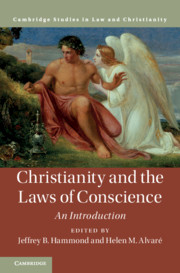Refine search
Actions for selected content:
6 results
9 - Angels
- from Part II - Theological Themes
-
-
- Book:
- The Origins of Scholasticism
- Published online:
- 18 November 2025
- Print publication:
- 31 December 2025, pp 260-283
-
- Chapter
- Export citation
4 - Synderesis, Conscientia, and Human Rights
- from Part I - Natural Law and the Origins of Human Rights
-
-
- Book:
- The Cambridge Handbook of Natural Law and Human Rights
- Published online:
- 03 November 2022
- Print publication:
- 17 November 2022, pp 61-73
-
- Chapter
- Export citation
3 - Inferno as Anti-narrative
- from Part I - Hell
-
- Book:
- Dante the Theologian
- Published online:
- 02 September 2022
- Print publication:
- 22 September 2022, pp 79-114
-
- Chapter
- Export citation
6 - St. Thomas Aquinas on Conscience
- from Part II - Conscience According to Major Figures and Traditions
-
-
- Book:
- Christianity and the Laws of Conscience
- Published online:
- 12 June 2021
- Print publication:
- 24 June 2021, pp 112-131
-
- Chapter
- Export citation

Christianity and the Laws of Conscience
- An Introduction
-
- Published online:
- 12 June 2021
- Print publication:
- 24 June 2021
Bibliography
-
- Book:
- The Reception of Aristotle's Ethics
- Published online:
- 05 February 2013
- Print publication:
- 13 December 2012, pp 289-306
-
- Chapter
- Export citation
